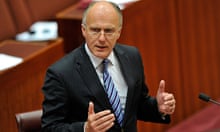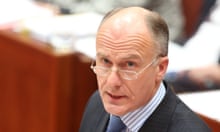A senior government minister, Eric Abetz, has faced criticism from the Australian Medical Association and the Breast Cancer Network of Australia for giving credence to a debunked link between abortion and breast cancer.
The employment minister, who is also the government’s leader in the Senate, said during a television interview: “I think the studies, and I think they date back from the 1950s, assert that there is a link between abortion and breast cancer.”
Abetz was defending his support for the upcoming World Congress of Families event in Melbourne where the speakers will include an American anti-abortion campaigner and doctor, Angela Lanfranchi, who also opposes use of the contraceptive pill.
But the World Health Organisation and leading medical bodies have said there is no evidence of a link, and the AMA and the Breast Cancer Network of Australia described Abetz’s comments as irresponsible because they could cause women unnecessary concern.
The AMA president, Brian Owler, told Guardian Australia: “I respect his right to have a view about abortion and I recognise there’s a range of views in the community … but what is inappropriate is for a senior member of the government to go on national television and use this pseudoscience of these false claims that have been put out by a group that is pushing a particular ideology to spread that ideology.
“That is irresponsible and not the behaviour we’d expect of a senior member of the government.”
Abetz has since tried to hose down the controversy, saying he “was cut off before being able to acknowledge that Dr Angela Lanfranchi’s views on this topic were not the accepted medical view”.
“Media reports that I have drawn or believe there is a link between abortion and breast cancer are incorrect,” he said in a statement.
The senator said he did not endorse the views of every speaker at the conference, but added that Lanfranchi was a breast cancer surgeon and had “the right to free speech in Australia”. “I accept the AMA has a right to disagree with Dr Lanfranchi’s views,” Abetz said.
The statement was designed to head off controversy generated by the minister’s interview with Ten’s The Project on Thursday night.
In the interview, Abetz said he was supporting the World Congress of Families “based on their basic views and beliefs that they support the traditional view of marriage and that they are pro-life”.
“They are two values that I personally and, might I add, many of our fellow Australians do hold dear,” he said.
When asked by the panellist and Mamamia publisher Mia Freedman whether he agreed with the “factually incorrect statement” promoted by one of the speakers that abortion led to breast cancer, Abetz referred to studies dating from the 1950s which “assert that there is a link”.
Freedman replied that it was “conclusively and scientifically incorrect” in the same way that the linking of vaccination to autism was incorrect.
Abetz: “Well, I don’t know what your scientific expertise is to be able to run that commentary; I confess that I don’t have the scientific expertise.”
Freedman: “It’s not me, it’s the AMA.”
Abetz: “Well there are other organisations that have differing views as some of these speakers are clinical professors.”
The lead national cancer control agency, Cancer Australia, states: “Research has shown there is no link between termination of pregnancy and increased risk of breast cancer.”
The World Health Organisation says: “Sound epidemiological data show no increased risk of breast cancer for women following spontaneous or induced abortion.”
The US National Cancer Institute said a February 2003 workshop it convened of more than 100 of the world’s leading experts who studied pregnancy and breast cancer risk “concluded that having an abortion or miscarriage does not increase a woman’s subsequent risk of developing breast cancer”.
“Considering the body of literature that has been published since 2003, when NCI held this extensive workshop on early reproductive events and cancer, the evidence overall still does not support early termination of pregnancy as a cause of breast cancer,” it said.
An American College of Obstetricians and Gynecologists committee concluded in 2009: “Early studies of the relationship between prior induced abortion and breast cancer risk were methodologically flawed. More rigorous recent studies demonstrate no causal relationship between induced abortion and a subsequent increase in breast cancer risk.”
The London-based Royal College of Obstetricians and Gynaecologists said its literature review found “no established link between induced abortion or miscarriage and development of breast cancer”.
The acting leader of the Greens, Adam Bandt, said Abetz should apologise because his comments were “an insult, not just to any woman who has suffered breast cancer or who has had an abortion, but to all women”.
“This is a government of old men who do not share modern Australian values,” he said. “If Senator Abetz accepts the science on this issue as he now claims, he should commit to not attending the World Congress of Families conference.”
Bandt said the prime minister, Tony Abbott, should ensure his cabinet members, including the social services minister, Kevin Andrews, did not attend the conference.
Labor’s shadow assistant treasurer, Andrew Leigh, told the ABC the Coalition’s views on science “seem to reflect their lack of a science minister”.
The health minister, Peter Dutton, said on Friday: “I believe very strongly that the medical evidence is clear and there is no link.”
The Breast Cancer Network of Australia raised its concerns about Lanfranchi’s planned presentation to the World Congress of Families.
“As the congress has attracted significant media attention recently, BCNA wishes to assure women that many studies show no proven link between breast cancer and abortion,” it said.
“In a review of the evidence, [Cancer Australia] refers to an international analysis that examined 53 independent studies of over 80,000 women from 16 different countries. This analysis found no link between breast cancer and abortion. Studies completed since that time, and cited by Cancer Australia, have published similar results.
“We are concerned the views being presented at the congress may cause unnecessary distress to women.”
Owler said Lanfranchi’s views were “completely off mainstream medicine”. “The AMA represents mainstream medicine; it certainly doesn’t represent the views of extremists who also link the oral contraceptive pill with domestic violence and a whole range of other things that are completely ludicrous.”






Comments (…)
Sign in or create your Guardian account to join the discussion